Reflective Practice Experience: Learning Disability Care in Nursing
VerifiedAdded on 2022/11/25
|8
|2505
|266
Report
AI Summary
This report presents a reflective analysis of a nursing student's experience in a medical ward, focusing on an episode of care involving a patient with learning disabilities, schizophrenia, and autism. The student utilizes Driscoll's Model of reflection to examine the incident, communication skills, and personal development needs. The reflection explores the student's feelings of nervousness and uncertainty when a practice supervisor questioned the student's ability to assist with patient care. The report delves into the importance of effective communication, risk assessment, and the need for nurses to adapt their communication based on the individual's needs, adhering to the NMC code of practice. The report concludes with the student's reflection on the incident and plans for future actions, including a deeper understanding of the importance of communication, risk assessment, and the Mental Capacity Act 2005. It also highlights the necessity for nurses to question discriminatory behaviors and to act as role models for high-quality care.

Paraphrase This Document
Need a fresh take? Get an instant paraphrase of this document with our AI Paraphraser
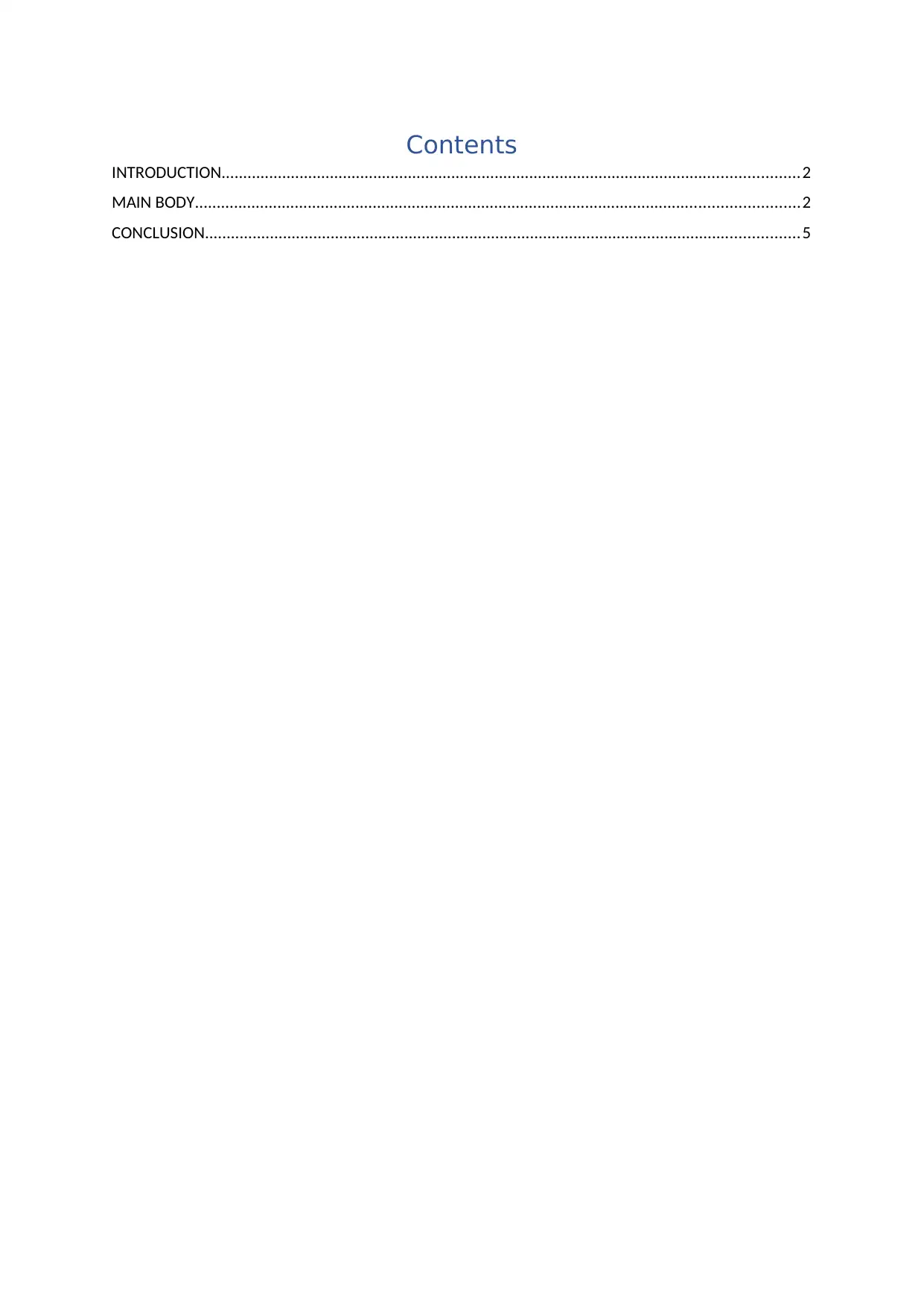
Contents
INTRODUCTION.....................................................................................................................................2
MAIN BODY...........................................................................................................................................2
CONCLUSION.........................................................................................................................................5
INTRODUCTION.....................................................................................................................................2
MAIN BODY...........................................................................................................................................2
CONCLUSION.........................................................................................................................................5
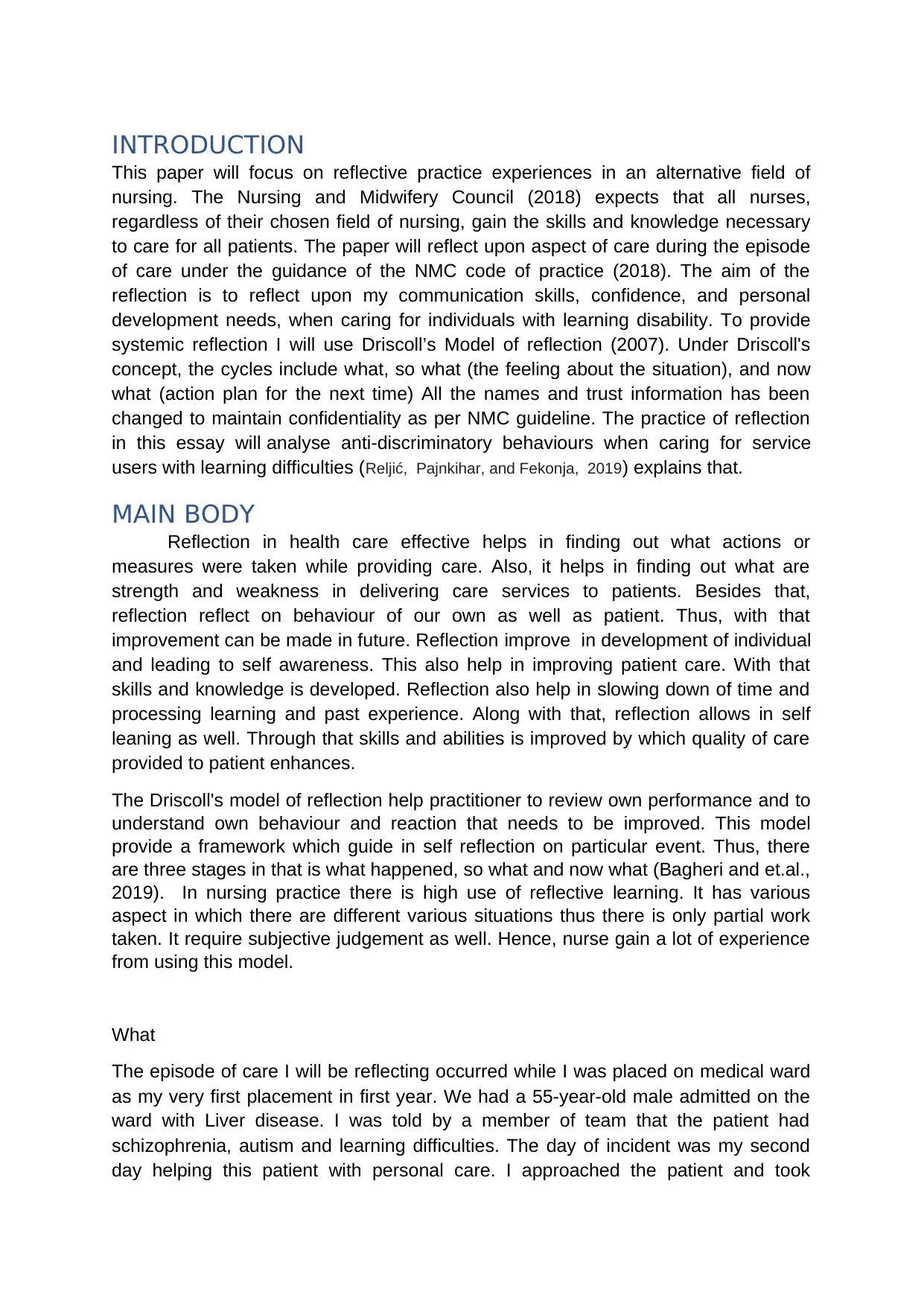
INTRODUCTION
This paper will focus on reflective practice experiences in an alternative field of
nursing. The Nursing and Midwifery Council (2018) expects that all nurses,
regardless of their chosen field of nursing, gain the skills and knowledge necessary
to care for all patients. The paper will reflect upon aspect of care during the episode
of care under the guidance of the NMC code of practice (2018). The aim of the
reflection is to reflect upon my communication skills, confidence, and personal
development needs, when caring for individuals with learning disability. To provide
systemic reflection I will use Driscoll’s Model of reflection (2007). Under Driscoll's
concept, the cycles include what, so what (the feeling about the situation), and now
what (action plan for the next time) All the names and trust information has been
changed to maintain confidentiality as per NMC guideline. The practice of reflection
in this essay will analyse anti-discriminatory behaviours when caring for service
users with learning difficulties (Reljić, Pajnkihar, and Fekonja, 2019) explains that.
MAIN BODY
Reflection in health care effective helps in finding out what actions or
measures were taken while providing care. Also, it helps in finding out what are
strength and weakness in delivering care services to patients. Besides that,
reflection reflect on behaviour of our own as well as patient. Thus, with that
improvement can be made in future. Reflection improve in development of individual
and leading to self awareness. This also help in improving patient care. With that
skills and knowledge is developed. Reflection also help in slowing down of time and
processing learning and past experience. Along with that, reflection allows in self
leaning as well. Through that skills and abilities is improved by which quality of care
provided to patient enhances.
The Driscoll's model of reflection help practitioner to review own performance and to
understand own behaviour and reaction that needs to be improved. This model
provide a framework which guide in self reflection on particular event. Thus, there
are three stages in that is what happened, so what and now what (Bagheri and et.al.,
2019). In nursing practice there is high use of reflective learning. It has various
aspect in which there are different various situations thus there is only partial work
taken. It require subjective judgement as well. Hence, nurse gain a lot of experience
from using this model.
What
The episode of care I will be reflecting occurred while I was placed on medical ward
as my very first placement in first year. We had a 55-year-old male admitted on the
ward with Liver disease. I was told by a member of team that the patient had
schizophrenia, autism and learning difficulties. The day of incident was my second
day helping this patient with personal care. I approached the patient and took
This paper will focus on reflective practice experiences in an alternative field of
nursing. The Nursing and Midwifery Council (2018) expects that all nurses,
regardless of their chosen field of nursing, gain the skills and knowledge necessary
to care for all patients. The paper will reflect upon aspect of care during the episode
of care under the guidance of the NMC code of practice (2018). The aim of the
reflection is to reflect upon my communication skills, confidence, and personal
development needs, when caring for individuals with learning disability. To provide
systemic reflection I will use Driscoll’s Model of reflection (2007). Under Driscoll's
concept, the cycles include what, so what (the feeling about the situation), and now
what (action plan for the next time) All the names and trust information has been
changed to maintain confidentiality as per NMC guideline. The practice of reflection
in this essay will analyse anti-discriminatory behaviours when caring for service
users with learning difficulties (Reljić, Pajnkihar, and Fekonja, 2019) explains that.
MAIN BODY
Reflection in health care effective helps in finding out what actions or
measures were taken while providing care. Also, it helps in finding out what are
strength and weakness in delivering care services to patients. Besides that,
reflection reflect on behaviour of our own as well as patient. Thus, with that
improvement can be made in future. Reflection improve in development of individual
and leading to self awareness. This also help in improving patient care. With that
skills and knowledge is developed. Reflection also help in slowing down of time and
processing learning and past experience. Along with that, reflection allows in self
leaning as well. Through that skills and abilities is improved by which quality of care
provided to patient enhances.
The Driscoll's model of reflection help practitioner to review own performance and to
understand own behaviour and reaction that needs to be improved. This model
provide a framework which guide in self reflection on particular event. Thus, there
are three stages in that is what happened, so what and now what (Bagheri and et.al.,
2019). In nursing practice there is high use of reflective learning. It has various
aspect in which there are different various situations thus there is only partial work
taken. It require subjective judgement as well. Hence, nurse gain a lot of experience
from using this model.
What
The episode of care I will be reflecting occurred while I was placed on medical ward
as my very first placement in first year. We had a 55-year-old male admitted on the
ward with Liver disease. I was told by a member of team that the patient had
schizophrenia, autism and learning difficulties. The day of incident was my second
day helping this patient with personal care. I approached the patient and took
⊘ This is a preview!⊘
Do you want full access?
Subscribe today to unlock all pages.

Trusted by 1+ million students worldwide
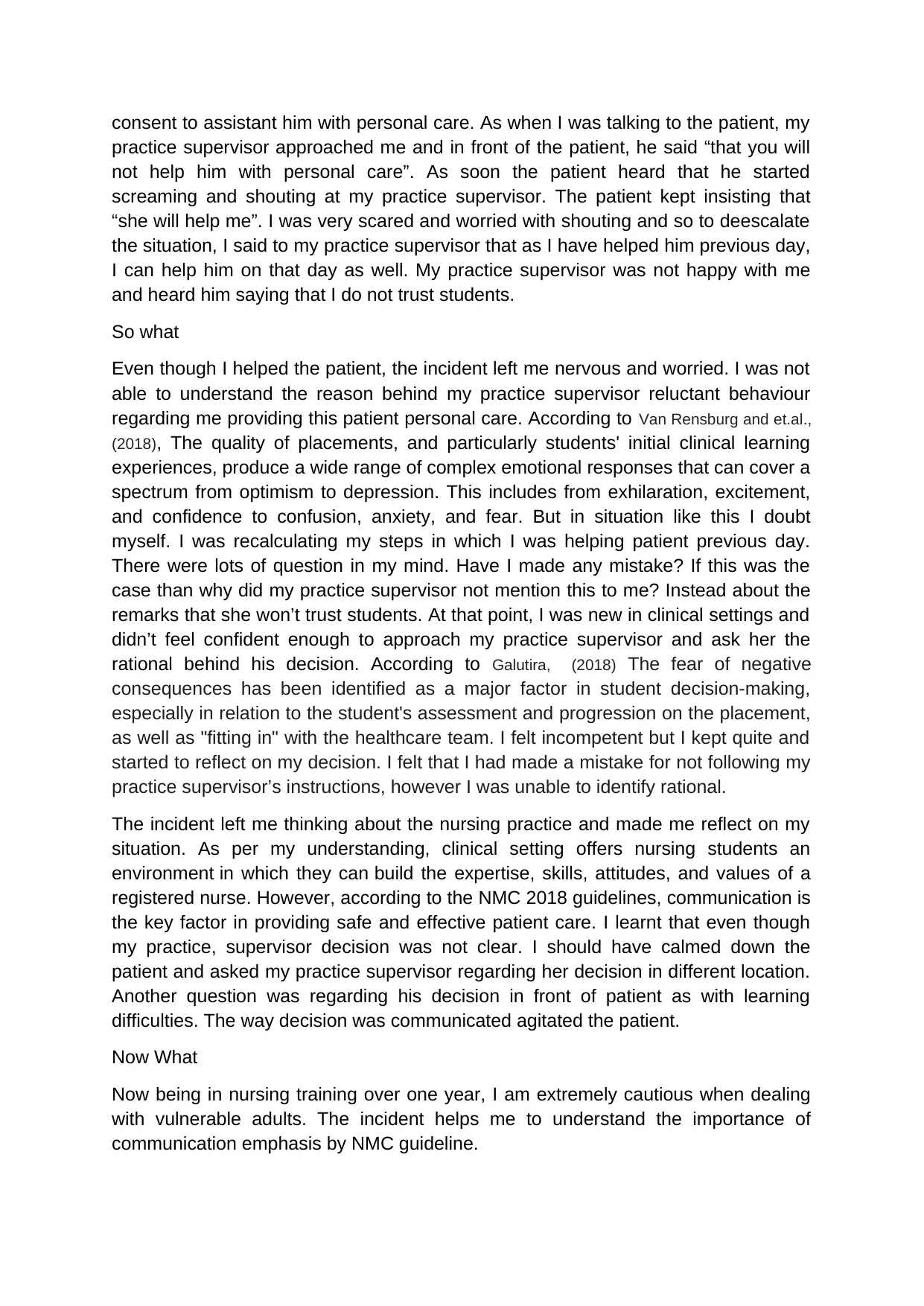
consent to assistant him with personal care. As when I was talking to the patient, my
practice supervisor approached me and in front of the patient, he said “that you will
not help him with personal care”. As soon the patient heard that he started
screaming and shouting at my practice supervisor. The patient kept insisting that
“she will help me”. I was very scared and worried with shouting and so to deescalate
the situation, I said to my practice supervisor that as I have helped him previous day,
I can help him on that day as well. My practice supervisor was not happy with me
and heard him saying that I do not trust students.
So what
Even though I helped the patient, the incident left me nervous and worried. I was not
able to understand the reason behind my practice supervisor reluctant behaviour
regarding me providing this patient personal care. According to Van Rensburg and et.al.,
(2018), The quality of placements, and particularly students' initial clinical learning
experiences, produce a wide range of complex emotional responses that can cover a
spectrum from optimism to depression. This includes from exhilaration, excitement,
and confidence to confusion, anxiety, and fear. But in situation like this I doubt
myself. I was recalculating my steps in which I was helping patient previous day.
There were lots of question in my mind. Have I made any mistake? If this was the
case than why did my practice supervisor not mention this to me? Instead about the
remarks that she won’t trust students. At that point, I was new in clinical settings and
didn’t feel confident enough to approach my practice supervisor and ask her the
rational behind his decision. According to Galutira, (2018) The fear of negative
consequences has been identified as a major factor in student decision-making,
especially in relation to the student's assessment and progression on the placement,
as well as "fitting in" with the healthcare team. I felt incompetent but I kept quite and
started to reflect on my decision. I felt that I had made a mistake for not following my
practice supervisor’s instructions, however I was unable to identify rational.
The incident left me thinking about the nursing practice and made me reflect on my
situation. As per my understanding, clinical setting offers nursing students an
environment in which they can build the expertise, skills, attitudes, and values of a
registered nurse. However, according to the NMC 2018 guidelines, communication is
the key factor in providing safe and effective patient care. I learnt that even though
my practice, supervisor decision was not clear. I should have calmed down the
patient and asked my practice supervisor regarding her decision in different location.
Another question was regarding his decision in front of patient as with learning
difficulties. The way decision was communicated agitated the patient.
Now What
Now being in nursing training over one year, I am extremely cautious when dealing
with vulnerable adults. The incident helps me to understand the importance of
communication emphasis by NMC guideline.
practice supervisor approached me and in front of the patient, he said “that you will
not help him with personal care”. As soon the patient heard that he started
screaming and shouting at my practice supervisor. The patient kept insisting that
“she will help me”. I was very scared and worried with shouting and so to deescalate
the situation, I said to my practice supervisor that as I have helped him previous day,
I can help him on that day as well. My practice supervisor was not happy with me
and heard him saying that I do not trust students.
So what
Even though I helped the patient, the incident left me nervous and worried. I was not
able to understand the reason behind my practice supervisor reluctant behaviour
regarding me providing this patient personal care. According to Van Rensburg and et.al.,
(2018), The quality of placements, and particularly students' initial clinical learning
experiences, produce a wide range of complex emotional responses that can cover a
spectrum from optimism to depression. This includes from exhilaration, excitement,
and confidence to confusion, anxiety, and fear. But in situation like this I doubt
myself. I was recalculating my steps in which I was helping patient previous day.
There were lots of question in my mind. Have I made any mistake? If this was the
case than why did my practice supervisor not mention this to me? Instead about the
remarks that she won’t trust students. At that point, I was new in clinical settings and
didn’t feel confident enough to approach my practice supervisor and ask her the
rational behind his decision. According to Galutira, (2018) The fear of negative
consequences has been identified as a major factor in student decision-making,
especially in relation to the student's assessment and progression on the placement,
as well as "fitting in" with the healthcare team. I felt incompetent but I kept quite and
started to reflect on my decision. I felt that I had made a mistake for not following my
practice supervisor’s instructions, however I was unable to identify rational.
The incident left me thinking about the nursing practice and made me reflect on my
situation. As per my understanding, clinical setting offers nursing students an
environment in which they can build the expertise, skills, attitudes, and values of a
registered nurse. However, according to the NMC 2018 guidelines, communication is
the key factor in providing safe and effective patient care. I learnt that even though
my practice, supervisor decision was not clear. I should have calmed down the
patient and asked my practice supervisor regarding her decision in different location.
Another question was regarding his decision in front of patient as with learning
difficulties. The way decision was communicated agitated the patient.
Now What
Now being in nursing training over one year, I am extremely cautious when dealing
with vulnerable adults. The incident helps me to understand the importance of
communication emphasis by NMC guideline.
Paraphrase This Document
Need a fresh take? Get an instant paraphrase of this document with our AI Paraphraser
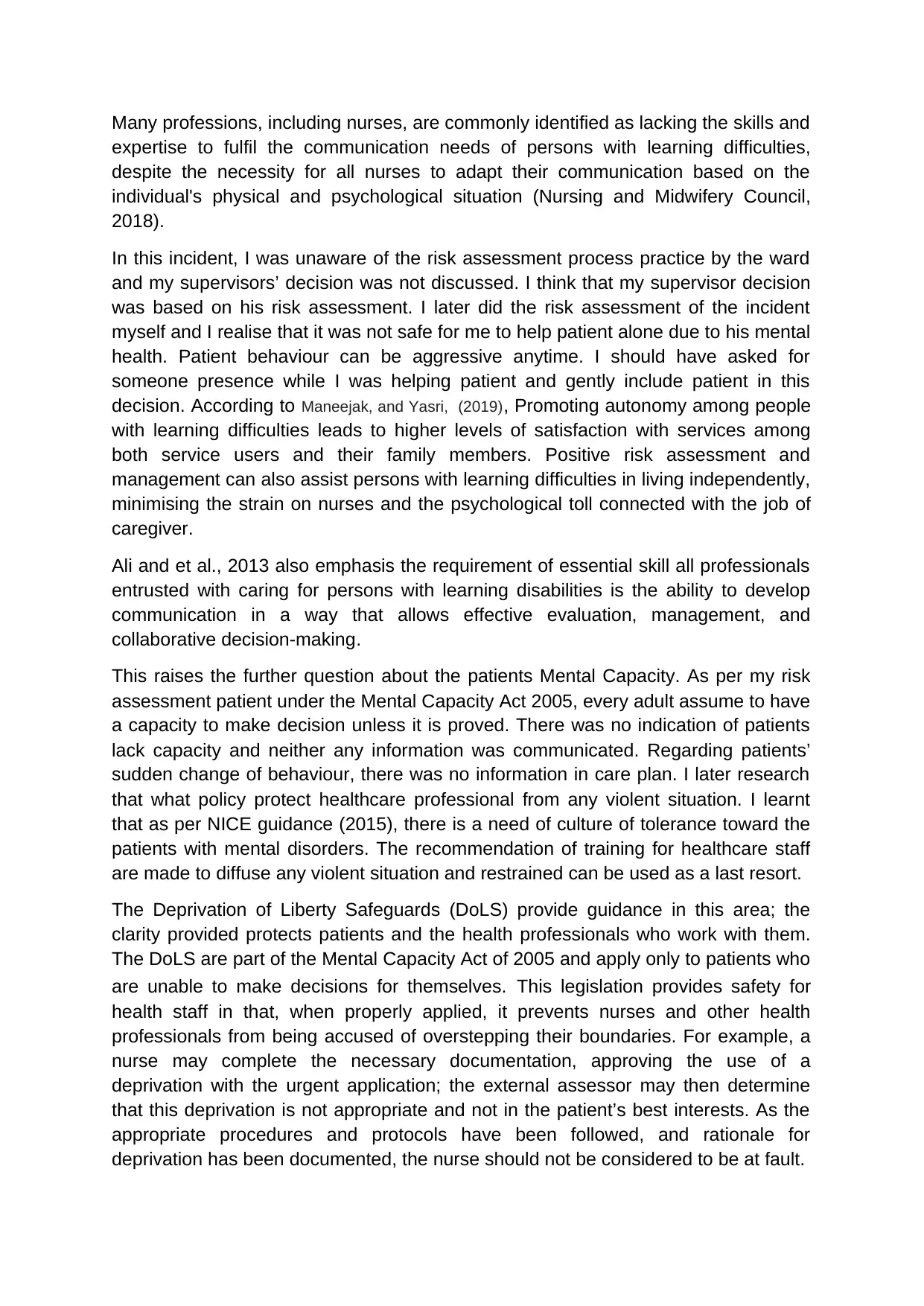
Many professions, including nurses, are commonly identified as lacking the skills and
expertise to fulfil the communication needs of persons with learning difficulties,
despite the necessity for all nurses to adapt their communication based on the
individual's physical and psychological situation (Nursing and Midwifery Council,
2018).
In this incident, I was unaware of the risk assessment process practice by the ward
and my supervisors’ decision was not discussed. I think that my supervisor decision
was based on his risk assessment. I later did the risk assessment of the incident
myself and I realise that it was not safe for me to help patient alone due to his mental
health. Patient behaviour can be aggressive anytime. I should have asked for
someone presence while I was helping patient and gently include patient in this
decision. According to Maneejak, and Yasri, (2019), Promoting autonomy among people
with learning difficulties leads to higher levels of satisfaction with services among
both service users and their family members. Positive risk assessment and
management can also assist persons with learning difficulties in living independently,
minimising the strain on nurses and the psychological toll connected with the job of
caregiver.
Ali and et al., 2013 also emphasis the requirement of essential skill all professionals
entrusted with caring for persons with learning disabilities is the ability to develop
communication in a way that allows effective evaluation, management, and
collaborative decision-making.
This raises the further question about the patients Mental Capacity. As per my risk
assessment patient under the Mental Capacity Act 2005, every adult assume to have
a capacity to make decision unless it is proved. There was no indication of patients
lack capacity and neither any information was communicated. Regarding patients’
sudden change of behaviour, there was no information in care plan. I later research
that what policy protect healthcare professional from any violent situation. I learnt
that as per NICE guidance (2015), there is a need of culture of tolerance toward the
patients with mental disorders. The recommendation of training for healthcare staff
are made to diffuse any violent situation and restrained can be used as a last resort.
The Deprivation of Liberty Safeguards (DoLS) provide guidance in this area; the
clarity provided protects patients and the health professionals who work with them.
The DoLS are part of the Mental Capacity Act of 2005 and apply only to patients who
are unable to make decisions for themselves. This legislation provides safety for
health staff in that, when properly applied, it prevents nurses and other health
professionals from being accused of overstepping their boundaries. For example, a
nurse may complete the necessary documentation, approving the use of a
deprivation with the urgent application; the external assessor may then determine
that this deprivation is not appropriate and not in the patient’s best interests. As the
appropriate procedures and protocols have been followed, and rationale for
deprivation has been documented, the nurse should not be considered to be at fault.
expertise to fulfil the communication needs of persons with learning difficulties,
despite the necessity for all nurses to adapt their communication based on the
individual's physical and psychological situation (Nursing and Midwifery Council,
2018).
In this incident, I was unaware of the risk assessment process practice by the ward
and my supervisors’ decision was not discussed. I think that my supervisor decision
was based on his risk assessment. I later did the risk assessment of the incident
myself and I realise that it was not safe for me to help patient alone due to his mental
health. Patient behaviour can be aggressive anytime. I should have asked for
someone presence while I was helping patient and gently include patient in this
decision. According to Maneejak, and Yasri, (2019), Promoting autonomy among people
with learning difficulties leads to higher levels of satisfaction with services among
both service users and their family members. Positive risk assessment and
management can also assist persons with learning difficulties in living independently,
minimising the strain on nurses and the psychological toll connected with the job of
caregiver.
Ali and et al., 2013 also emphasis the requirement of essential skill all professionals
entrusted with caring for persons with learning disabilities is the ability to develop
communication in a way that allows effective evaluation, management, and
collaborative decision-making.
This raises the further question about the patients Mental Capacity. As per my risk
assessment patient under the Mental Capacity Act 2005, every adult assume to have
a capacity to make decision unless it is proved. There was no indication of patients
lack capacity and neither any information was communicated. Regarding patients’
sudden change of behaviour, there was no information in care plan. I later research
that what policy protect healthcare professional from any violent situation. I learnt
that as per NICE guidance (2015), there is a need of culture of tolerance toward the
patients with mental disorders. The recommendation of training for healthcare staff
are made to diffuse any violent situation and restrained can be used as a last resort.
The Deprivation of Liberty Safeguards (DoLS) provide guidance in this area; the
clarity provided protects patients and the health professionals who work with them.
The DoLS are part of the Mental Capacity Act of 2005 and apply only to patients who
are unable to make decisions for themselves. This legislation provides safety for
health staff in that, when properly applied, it prevents nurses and other health
professionals from being accused of overstepping their boundaries. For example, a
nurse may complete the necessary documentation, approving the use of a
deprivation with the urgent application; the external assessor may then determine
that this deprivation is not appropriate and not in the patient’s best interests. As the
appropriate procedures and protocols have been followed, and rationale for
deprivation has been documented, the nurse should not be considered to be at fault.
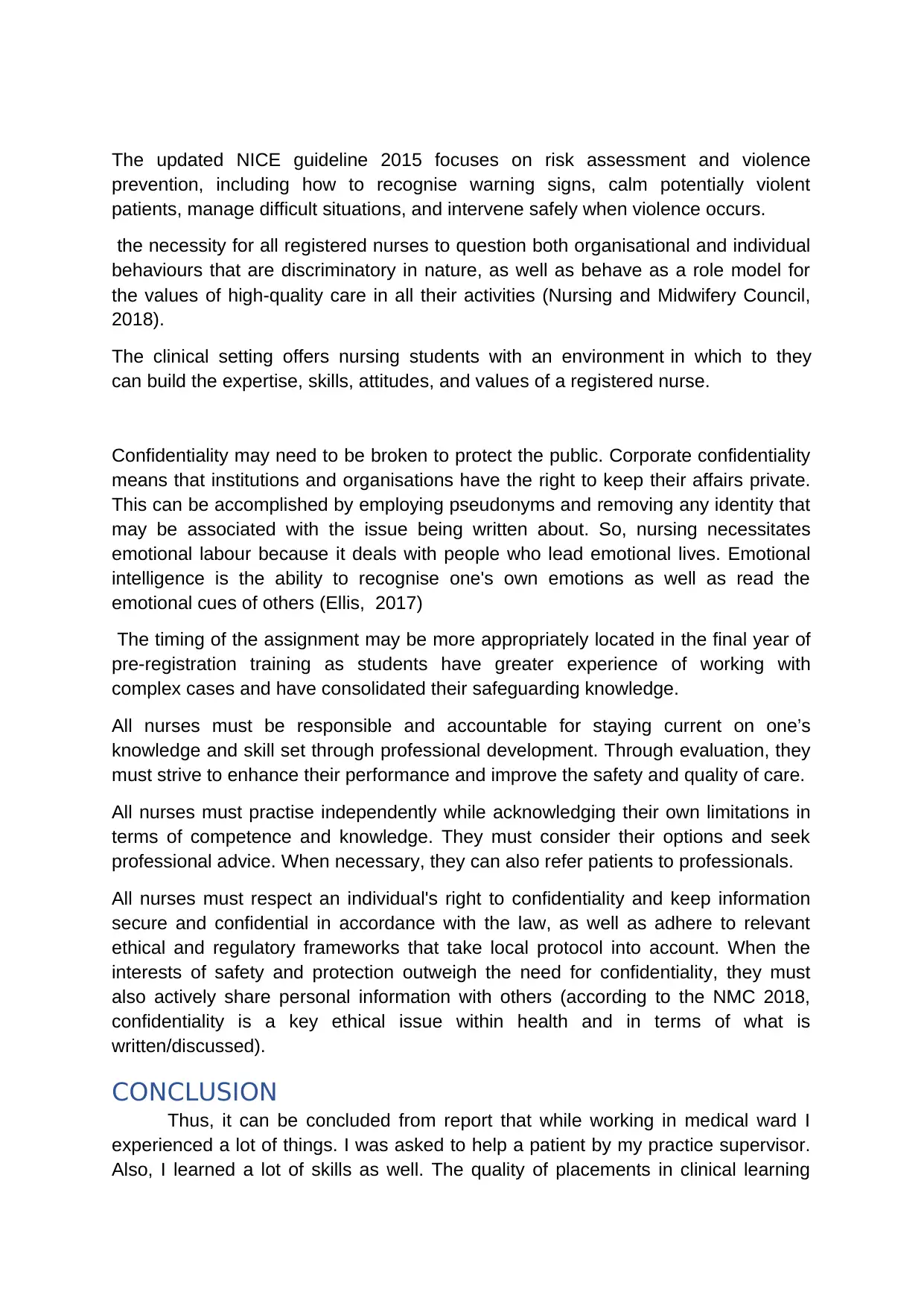
The updated NICE guideline 2015 focuses on risk assessment and violence
prevention, including how to recognise warning signs, calm potentially violent
patients, manage difficult situations, and intervene safely when violence occurs.
the necessity for all registered nurses to question both organisational and individual
behaviours that are discriminatory in nature, as well as behave as a role model for
the values of high-quality care in all their activities (Nursing and Midwifery Council,
2018).
The clinical setting offers nursing students with an environment in which to they
can build the expertise, skills, attitudes, and values of a registered nurse.
Confidentiality may need to be broken to protect the public. Corporate confidentiality
means that institutions and organisations have the right to keep their affairs private.
This can be accomplished by employing pseudonyms and removing any identity that
may be associated with the issue being written about. So, nursing necessitates
emotional labour because it deals with people who lead emotional lives. Emotional
intelligence is the ability to recognise one's own emotions as well as read the
emotional cues of others (Ellis, 2017)
The timing of the assignment may be more appropriately located in the final year of
pre-registration training as students have greater experience of working with
complex cases and have consolidated their safeguarding knowledge.
All nurses must be responsible and accountable for staying current on one’s
knowledge and skill set through professional development. Through evaluation, they
must strive to enhance their performance and improve the safety and quality of care.
All nurses must practise independently while acknowledging their own limitations in
terms of competence and knowledge. They must consider their options and seek
professional advice. When necessary, they can also refer patients to professionals.
All nurses must respect an individual's right to confidentiality and keep information
secure and confidential in accordance with the law, as well as adhere to relevant
ethical and regulatory frameworks that take local protocol into account. When the
interests of safety and protection outweigh the need for confidentiality, they must
also actively share personal information with others (according to the NMC 2018,
confidentiality is a key ethical issue within health and in terms of what is
written/discussed).
CONCLUSION
Thus, it can be concluded from report that while working in medical ward I
experienced a lot of things. I was asked to help a patient by my practice supervisor.
Also, I learned a lot of skills as well. The quality of placements in clinical learning
prevention, including how to recognise warning signs, calm potentially violent
patients, manage difficult situations, and intervene safely when violence occurs.
the necessity for all registered nurses to question both organisational and individual
behaviours that are discriminatory in nature, as well as behave as a role model for
the values of high-quality care in all their activities (Nursing and Midwifery Council,
2018).
The clinical setting offers nursing students with an environment in which to they
can build the expertise, skills, attitudes, and values of a registered nurse.
Confidentiality may need to be broken to protect the public. Corporate confidentiality
means that institutions and organisations have the right to keep their affairs private.
This can be accomplished by employing pseudonyms and removing any identity that
may be associated with the issue being written about. So, nursing necessitates
emotional labour because it deals with people who lead emotional lives. Emotional
intelligence is the ability to recognise one's own emotions as well as read the
emotional cues of others (Ellis, 2017)
The timing of the assignment may be more appropriately located in the final year of
pre-registration training as students have greater experience of working with
complex cases and have consolidated their safeguarding knowledge.
All nurses must be responsible and accountable for staying current on one’s
knowledge and skill set through professional development. Through evaluation, they
must strive to enhance their performance and improve the safety and quality of care.
All nurses must practise independently while acknowledging their own limitations in
terms of competence and knowledge. They must consider their options and seek
professional advice. When necessary, they can also refer patients to professionals.
All nurses must respect an individual's right to confidentiality and keep information
secure and confidential in accordance with the law, as well as adhere to relevant
ethical and regulatory frameworks that take local protocol into account. When the
interests of safety and protection outweigh the need for confidentiality, they must
also actively share personal information with others (according to the NMC 2018,
confidentiality is a key ethical issue within health and in terms of what is
written/discussed).
CONCLUSION
Thus, it can be concluded from report that while working in medical ward I
experienced a lot of things. I was asked to help a patient by my practice supervisor.
Also, I learned a lot of skills as well. The quality of placements in clinical learning
⊘ This is a preview!⊘
Do you want full access?
Subscribe today to unlock all pages.

Trusted by 1+ million students worldwide
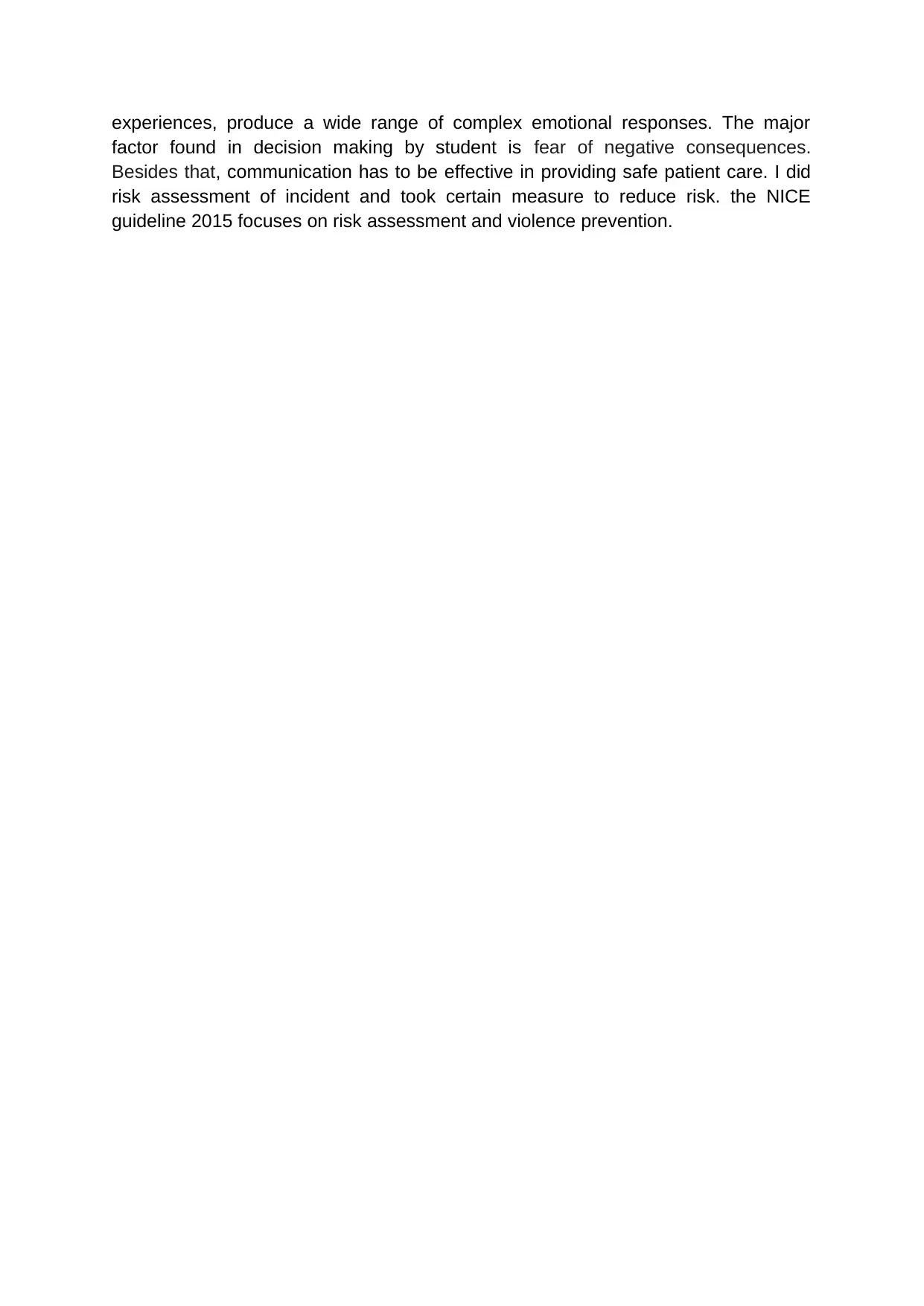
experiences, produce a wide range of complex emotional responses. The major
factor found in decision making by student is fear of negative consequences.
Besides that, communication has to be effective in providing safe patient care. I did
risk assessment of incident and took certain measure to reduce risk. the NICE
guideline 2015 focuses on risk assessment and violence prevention.
factor found in decision making by student is fear of negative consequences.
Besides that, communication has to be effective in providing safe patient care. I did
risk assessment of incident and took certain measure to reduce risk. the NICE
guideline 2015 focuses on risk assessment and violence prevention.
Paraphrase This Document
Need a fresh take? Get an instant paraphrase of this document with our AI Paraphraser
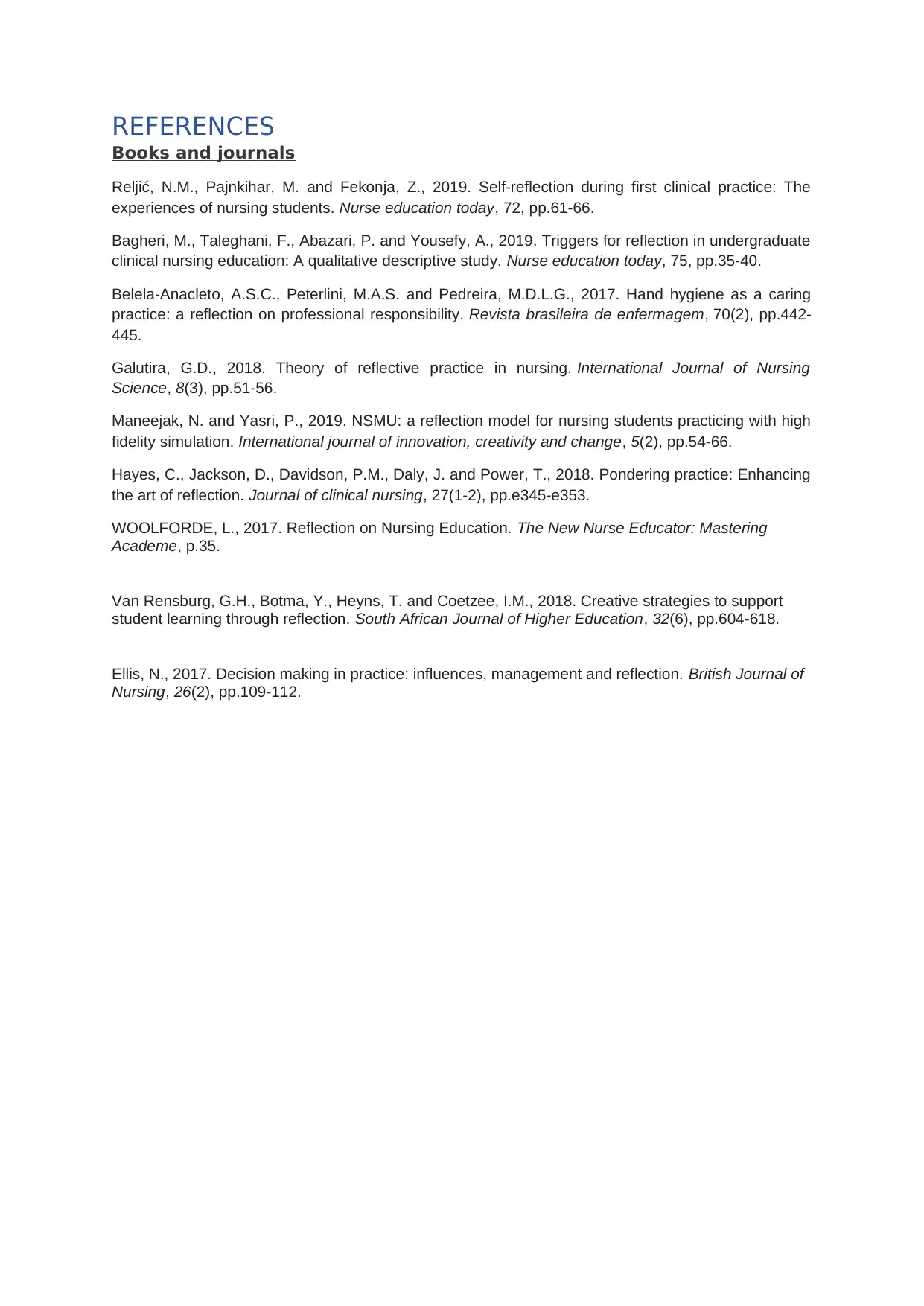
REFERENCES
Books and journals
Reljić, N.M., Pajnkihar, M. and Fekonja, Z., 2019. Self-reflection during first clinical practice: The
experiences of nursing students. Nurse education today, 72, pp.61-66.
Bagheri, M., Taleghani, F., Abazari, P. and Yousefy, A., 2019. Triggers for reflection in undergraduate
clinical nursing education: A qualitative descriptive study. Nurse education today, 75, pp.35-40.
Belela-Anacleto, A.S.C., Peterlini, M.A.S. and Pedreira, M.D.L.G., 2017. Hand hygiene as a caring
practice: a reflection on professional responsibility. Revista brasileira de enfermagem, 70(2), pp.442-
445.
Galutira, G.D., 2018. Theory of reflective practice in nursing. International Journal of Nursing
Science, 8(3), pp.51-56.
Maneejak, N. and Yasri, P., 2019. NSMU: a reflection model for nursing students practicing with high
fidelity simulation. International journal of innovation, creativity and change, 5(2), pp.54-66.
Hayes, C., Jackson, D., Davidson, P.M., Daly, J. and Power, T., 2018. Pondering practice: Enhancing
the art of reflection. Journal of clinical nursing, 27(1-2), pp.e345-e353.
WOOLFORDE, L., 2017. Reflection on Nursing Education. The New Nurse Educator: Mastering
Academe, p.35.
Van Rensburg, G.H., Botma, Y., Heyns, T. and Coetzee, I.M., 2018. Creative strategies to support
student learning through reflection. South African Journal of Higher Education, 32(6), pp.604-618.
Ellis, N., 2017. Decision making in practice: influences, management and reflection. British Journal of
Nursing, 26(2), pp.109-112.
Books and journals
Reljić, N.M., Pajnkihar, M. and Fekonja, Z., 2019. Self-reflection during first clinical practice: The
experiences of nursing students. Nurse education today, 72, pp.61-66.
Bagheri, M., Taleghani, F., Abazari, P. and Yousefy, A., 2019. Triggers for reflection in undergraduate
clinical nursing education: A qualitative descriptive study. Nurse education today, 75, pp.35-40.
Belela-Anacleto, A.S.C., Peterlini, M.A.S. and Pedreira, M.D.L.G., 2017. Hand hygiene as a caring
practice: a reflection on professional responsibility. Revista brasileira de enfermagem, 70(2), pp.442-
445.
Galutira, G.D., 2018. Theory of reflective practice in nursing. International Journal of Nursing
Science, 8(3), pp.51-56.
Maneejak, N. and Yasri, P., 2019. NSMU: a reflection model for nursing students practicing with high
fidelity simulation. International journal of innovation, creativity and change, 5(2), pp.54-66.
Hayes, C., Jackson, D., Davidson, P.M., Daly, J. and Power, T., 2018. Pondering practice: Enhancing
the art of reflection. Journal of clinical nursing, 27(1-2), pp.e345-e353.
WOOLFORDE, L., 2017. Reflection on Nursing Education. The New Nurse Educator: Mastering
Academe, p.35.
Van Rensburg, G.H., Botma, Y., Heyns, T. and Coetzee, I.M., 2018. Creative strategies to support
student learning through reflection. South African Journal of Higher Education, 32(6), pp.604-618.
Ellis, N., 2017. Decision making in practice: influences, management and reflection. British Journal of
Nursing, 26(2), pp.109-112.
1 out of 8
Related Documents
Your All-in-One AI-Powered Toolkit for Academic Success.
+13062052269
info@desklib.com
Available 24*7 on WhatsApp / Email
![[object Object]](/_next/static/media/star-bottom.7253800d.svg)
Unlock your academic potential
Copyright © 2020–2026 A2Z Services. All Rights Reserved. Developed and managed by ZUCOL.





